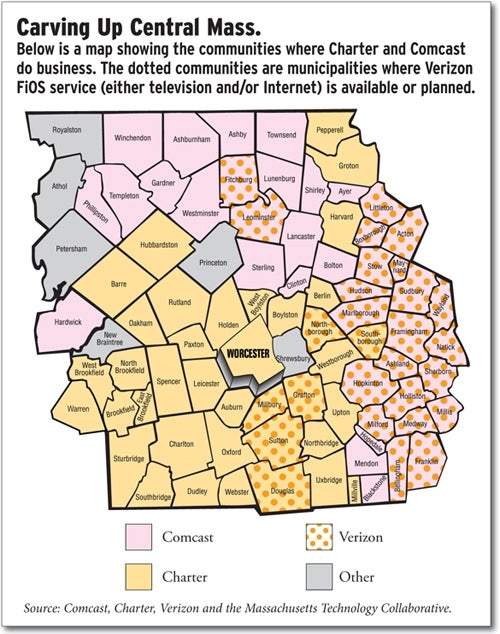Coming Soon To A Television Set Near You | Verizon expansion moves cable battle deep into Central Mass.
If all goes as planned, residents and businesses in 11 new Central Massachusetts communities, including Fitchburg, Millbury and Grafton, will soon find themselves with a choice that, until recently, was reserved for those closer to Boston: cable or Verizon FiOS.
Verizon says it has already expanded its fiber-optic network into the cities and towns, and it is now negotiating with local cable committees to provide television service in addition to Internet access and phone service.
The expansion means Central Massachusetts will become far more of a battlefield in the contest between Verizon and the two major cable companies serving the region, Comcast and Charter Communications. But while Verizon sees its continuing expansion as a bold move to take on cable where it lives, the cable companies paint it as an act of desperation.
East-West Divide
Talk to people who live or work in the western half of the state about Verizon, and you may hear a touch of bitterness.
While the company has rolled out fancy, super-fast Internet connections and bundles of telephone and video service in the Boston suburbs, DSL is still the norm in much of the state, and parts of Western Massachusetts are still stuck with dial-up connections.
But Philip Santoro, a spokesman for Verizon, says that contrary to many people's impressions the telecom giant doesn't base its expansion into new communities on local income levels, or even on population density. Instead, he said, the decisions are based on the availability of local work crews, the willingness of community leaders to streamline the cable franchising process and the condition of the existing copper wiring in town.
"If you have to replace the copper in a particular area, there's no sense putting more copper in there," he said.
Santoro said the only issue that makes it harder to build fiber networks in some communities is actually high population density. In cities like Boston and Worcester, issues like buried phone lines and dense collections of wires and pipes along major streets make it much more difficult to complete upgrades. Neither location has FiOS yet.
While Verizon builds new networks, the cable companies are not standing still. Comcast and Charter are both increasing the bandwidth on their networks to offer faster Internet and more high definition television channels. Both now offer packages promising extra-fast download speeds of up to 16 megabits per second. That's much faster than the standard DSL speed of 1.5 mbps, but not nearly as fast as the priciest FiOS option, which comes in at 50 mbps.
Comcast and Verizon both say they anticipate offering speeds of more than 100 mbps in the future.
Dan Blakeman, vice president of Comcast's Northern Massachusetts system, said his company is particularly interested in marketing to small- and medium-sized businesses.
He says a new "business-class phone service" offers phone features that might not have been affordable smaller companies in the past, along with fast Internet and cable TV.
"When we put those three products together we have a very compelling product sitting on [our] advanced network," he said.
Serious Money
Still, everyone agrees that Verizon is the big spender in the picture. In 2008, the company says, it is spending $200 million to expand its broadband network in Massachusetts alone.
But Tom Cohan, director of government relations for Charter's Worcester-based New England/New York office, says that's because the telephone giant doesn't have much choice. Between cell phones and the cable companies' new phone services, he said, landline phones are a shrinking business."
They're just bleeding telephone customers," he said. "They had to do something."
Whatever its reasons, Verizon is moving fast. In the past three years, Santoro said, it has won cable franchises in about 30 communities a year, starting in a ring around Boston and moving outward from there.
Santoro said the company would actually like to move even faster, but the process of getting approval community by community slows it down.
Verizon has been working for a law that would change the way franchises are handed out, moving the approval process to the state level, but so far the bill hasn't moved forward.
"If you reform the process and make it less cumbersome and more streamlined like they have in 13 other states in the nation in recent years, then we can make the case to our corporation to give us more money," he said.













0 Comments